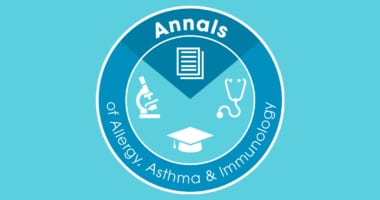Spring is right around the corner, and the season brings allergic conditions to the spotlight. With so much attention focused on asthma and allergies, this is a great time of year to share your expertise with your community – through special events or media interviews.
Ready for your close-up?
With so many people getting their news from social media, you may wonder how to get information about allergies and asthma in front of members of your community. Social media is great, but stories told by third party sources – in newspapers, radio and tv – also still have value and attract thousands of readers, viewers and listeners.
Media interviews are an excellent opportunity to educate people in your community about allergy issues. You can be proactive and pitch yourself as an allergy expert to local, state or regional media. The College can help you get started. Use our free seasonal article templates – we’ve written the article, all you need to do is customize it with your information. Email the customized article to local media outlets. Most have an email address for story ideas and tips.
When you’ve agreed to participate in a media interview, consider these tips:
- This is your interview– Many people go into an interview thinking, “As long as I can answer their questions, I’m good.” But an interview is an exchange of information. The reporter contacted you because you have information they need. Before the interview, know your message. What do you want the headline to say? What should readers know after the story runs?
- Don’t let yourself be rushed– If a reporter wants an interview “right away,” ask what their deadline is and tell them you will call back in 15-30 minutes – or longer if time allows. Give yourself time to determine what you want to say and what information you want to include.
- You probably won’t review the story before it appears– While you can ask the reporter to send you the story before it runs, they probably won’t oblige. You’re better off asking them to send their questions in advance, so you know what information to prepare.
- Don’t speak like a scientist– You earned a medical degree and know lots of technical names for things. But if your audience doesn’t understand you or the acronyms you use, you’re not communicating. Speak as if counseling a patient. Use simple terms and repeat points for emphasis.
- Never say “no comment”– Although TV and movie actors say, “no comment,” you’ll look like you’re hiding something. Instead say, “I’m sorry, I don’t have that information because it’s not my area of expertise.” Or, “We’ve never studied that, so we don’t have data on it.” You can also use it as an opportunity to restate your message: “I can only tell you what the data in our study showed, which was that…” It is always okay to “bridge” back to an important point YOU want to make, rather than continuing to answer questions that are not in your comfort zone.
- Follow up with charts and graphs– Reporters may not retain the data you offer. Follow up the interview with charts and/or graphs that support your statements. The reporter will appreciate seeing the information in black and white, and you’ve made yourself a valuable resource for the next time they’re looking for an allergy expert.
Remember when going into an interview that you’re the expert with the information the reporter wants to write their story. They need you to fill in the blanks. Use interviews to build up your voice as a community expert and to become a resource that reporters come back to again and again.
Plan ahead for National Asthma and Allergy Awareness Month
Media interviews and social media aren’t the only ways to let people know about spring allergies (and the relief that an allergist’s care can provide). It’s not too early to think about National Asthma and Allergy Awareness Month, which is in May. Use our Allergy and Asthma Awareness Toolkit for ideas to share your expertise on asthma and allergic conditions and connect with your community.
Asthma and Allergy Awareness Month is a great time to participate in an asthma screening event. Since May is several months away, there is time to organize an event. Use the College’s Asthma Screening Event Planning Guide for ideas and resources to plan and host an asthma screening.
If your local high school or middle school has a Career Day, think about sharing your experience as an allergist. You could also update students about allergic conditions. Also, libraries and senior centers may be looking for speakers to present talks on specific topics, and allergic conditions would be very timely in spring. Use the PowerPoint presentation in our toolkit for an in-person or virtual talk.
Now is the time to plan ahead for National Asthma and Allergy Awareness Month! If an asthma screening or lecture aren’t among your projects, the Allergy and Asthma Awareness Toolkit has plenty of other ideas – and most don’t require a lot of advanced planning.




